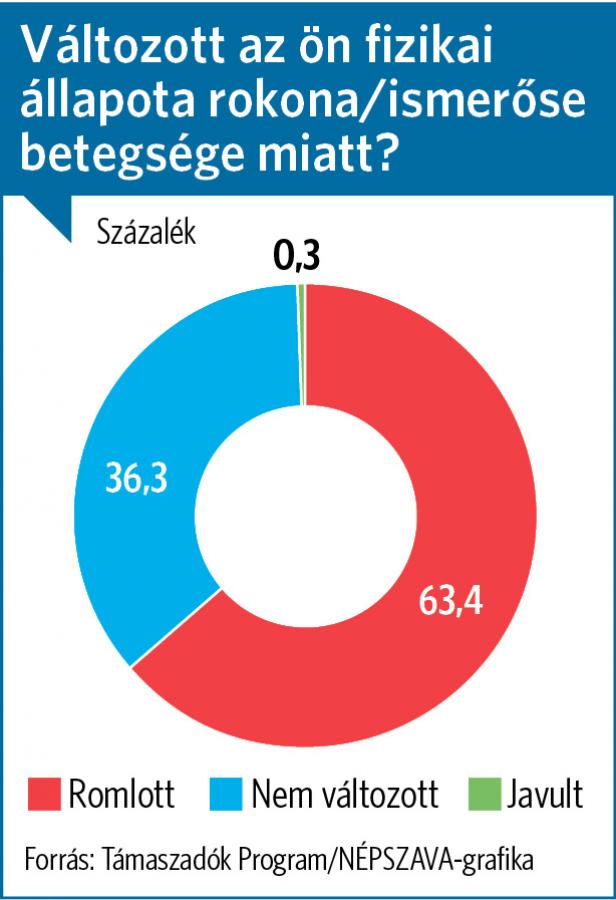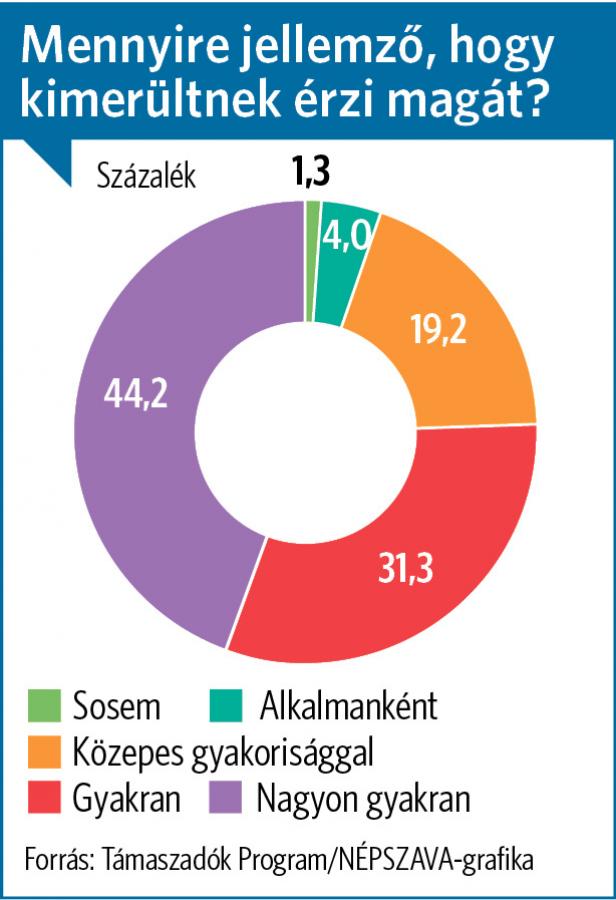“I wasn’t expecting cheerful statistics, but to be honest, I was also shocked by the results of the research. There were times when I checked the methodology once more to make sure that the situation is really that bad,” sociologist Mónika Deli told our newspaper. Before the launch of the Támaszadók Program, a national survey was conducted among people who care for a sick relative at home. The researchers were curious about the effect of caring for a seriously and/or permanently ill or disabled person on their relatives. The result can actually be summed up in two words: shocking and heartbreaking.
Talking to mental health professionals and psychologists, it is often said: the mental state of the Hungarian population is terrible. Even those whose lives are “in order” (meaning: they have a job, a home, a living). So what can we expect in the case of people whose lives take a 180-degree turn when it turns out that one of their relatives is seriously ill, and from then on their lives revolve around caring for their family member? The sociologist explained how widespread this problem is: in Hungary, hundreds of thousands of family members are typically cared for at home by women. Of course, the wider circle of family and friends is much larger than this, and these people often do not receive adequate help to be able to process the situation they have found themselves in.
Explaining the results of the survey, he emphasized: in connection with the illness of the family member being cared for, the health of 63 percent of the respondents helping the chronic patient worsened, and the emotional state of 85 percent. The disease does not spare the family coffers either: 59 percent reported that their financial situation had worsened, and 75 percent that their overall quality of life had worsened. Three out of four caregivers often or constantly worry about their loved one’s situation, and the same number often or constantly feel exhausted. The long-term illness also leaves its mark on human relationships: 37 percent of the relatives have deteriorated their relationship with their family member who needs care.
They were also curious about what causes the greatest difficulty in everyday life. The respondents could indicate several answers to this question, the overwhelming majority mentioned the feeling of helplessness (68 percent), but 57 percent also highlighted their own emotional and 53 percent their own physical exhaustion. The daily lives of half of the family members are made difficult by their own anxiety, the patient’s depression, and the fact that they feel lonely and isolated. The lack of external help was mentioned by 41 percent, but financial problems are also typical in this group. The answers to the question of what would constitute meaningful help can be divided into four main groups. The first is spiritual support, mental counseling, the opportunity to rest, to free yourself from the burden of tasks for at least a few hours a week. In the second round, they mentioned the creation of financial security and a higher amount of care. The third group included the sharing of responsibility, the involvement of other people in the care – either several family members or professionals (masseur, physiotherapist, cleaner). The fourth main group of help was the provision of information, on the one hand about the disease, on the other hand about care methods, and even about institutional placement.

In order to make the life of family members easier, a program was launched last year. The Hungarian Multiple Sclerosis Foundation first conducted a survey among patients affected by MS and their relatives, then published a book to help with care and organized informational events. The demand for their program was so great that the foundation initiated it: the domestic patient organizations and foundations should come together and start a civil movement for family members who help chronically ill family members, regardless of the specific illness – since the problems of the helpers are very similar. 14 organizations joined the Supporters Program, and the start of the program was announced on October 21.

“On the tamaszadok.hu page, we collect and publish the information that can help relatives regardless of the type of illness,” said health journalist László B. Papp, one of the founders of the program. On the website, those affected can read about nursing tasks, get spiritual help, and be informed about how to access social assistance, but they can also watch short report films in which those affected tell about their lives and their situation. The films highlight the fact that although the diagnosis of a serious illness affects one person the most, many people around him are actually burdened with the illness. “In addition, we would like to draw the government’s attention to how important it would be to raise nursing fees, expand rehabilitation opportunities, and strengthen the social network around the people who care for the sick.” The professional journalist also mentioned: in fact, we can all do something for these people, even if we sometimes ask them: “How are you?” Let’s set aside a quarter of an hour, call that friend or relative who we know cares for a patient, and listen to their problems, thereby easing their mental burden. Everyone deserves care and attention, not only patients, but also their helpers. They also need to recharge, but also not to feel guilty about it. After all, they can only give if they also receive.
Source: nepszava.hu


